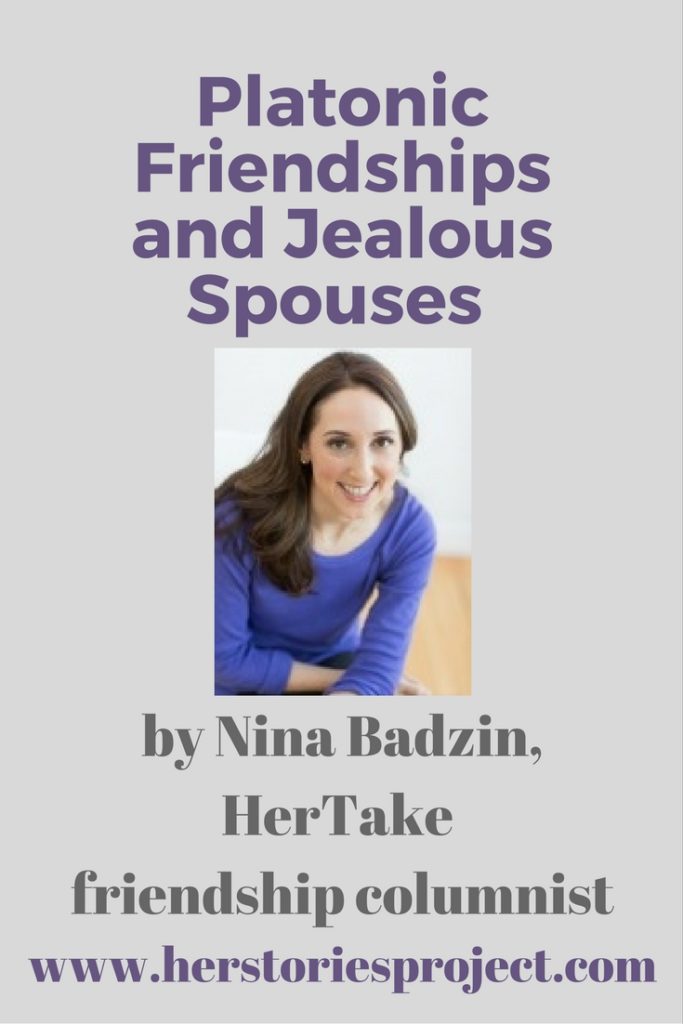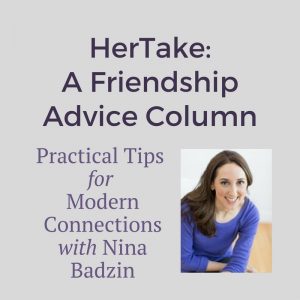Platonic Friendships and Jealous Spouses
In this month’s HerTake question, Nina answers a letter about a longstanding friendship between a man and a woman that the man’s wife objects to now (years later). How much influence does one spouse get to have on the other’s platonic friendships? And can a friendship successfully scale back from a higher level of closeness to something more casual?
Do you have a question for Nina? Use our anonymous form. You can read Nina’s answers to past questions here.
Dear Nina,
I am uncertain about how to proceed in a longtime friendship that has seemingly created some tension in my friend’s marriage. By way of background, I am female and he is male, we met a long time ago in college, and our relationship has ALWAYS been platonic. I mean not even the “too much beer at a frat party” kind of kiss has ever even happened. Each of us has also been married for a long time; I am quite happily married and, for the most part, he has seemed happy in his too, minus a rough patch they had a few years ago (the details of which I do not know).
Although we attended college together, we have not lived geographically close since that time, so our communication has always been online. Before the advent of Facebook and texting, we kept in touch via intermittent email about life events (marriages, babies, jobs, etc.). Then when Facebook became de rigueur, we connected that way instead (though not much interaction happens there), and we text every once in a while (say, maybe once every month or two at most, usually about an article one of us read that the other might be interested in, asking about jobs, etc.). Once in a great while, like when he was going through something in his personal life that he needed another take on, a longer email might be exchanged, but that is very rare.
Like I do with virtually everyone in my life, I occasionally sign my texts/emails with a (what I thought to be) nonchalant “xo” to signify that I was “signing off” so to speak. Flash forward to now and it seems as though there is some kind of distress being felt by his spouse about several of his female texting friends who do this kind of thing, though it is unclear whether she considers me one of them too. Their marriage does appear to be on the brink and this all seems to have been the proverbial straw after she went through his phone recently. In not so many words, he alerted me about this, that his spouse reads his texts and will do more so now, and more or less told me to keep it “professional” going forward.
This has left me feeling very uncertain about how (or whether) to proceed in our friendship. I want him, above all else, to work out his marriage problems because he is my friend. And though I can certainly eliminate the “xo” from our communications (and will!), I feel like I cannot be myself anymore and that I am being monitored by his wife despite a completely platonic relationship. If anyone is sensitive to this kind of thing, it is me having witnessed a close family member deal with an extramarital affair. Is this friendship salvageable, and how? How does one go from being fairly close for almost two decades to feeling like it must be limited to small talk?
Signed,
Not The Other Woman
Dear Not The Other Woman,
I see two questions in your letter. First, how much influence should one spouse have on the other spouse’s friendships? Second, can a friendship successfully scale back from a higher level of closeness to something more casual?
Some readers may wonder about the underlying question of the viability of platonic relationships when one or both participants of that friendship are married or committed to other people. In April 2015, I received a letter from a married woman who missed having male friends in her life. Since this woman works from home, she finds that the only men she interacts with on a regular basis are her friends’ husbands, and she doesn’t find conversation with any of them particularly stimulating. She wanted to know if a friendship with a man was worth pursuing for its own sake.
In that situation, it was clear (to me) that purposely fostering a new relationship with an opposite sex friend was risky territory for a married person. (Several commenters respectfully disagreed.) My thought was that while the friendship could certainly stay platonic, it was also reasonable to acknowledge that many romantic relationships start with a friendship.
Your situation with a friendship that preceded your marriage feels entirely different. And the fact that you and this man had no sexual tension in your history makes me believe the friendship has been worth holding on to all this time. As the woman in the April letter pointed out, it’s no easy task to make opposite-sex friends the older we get. Especially if you work from home! All that said, two decades of friendship doesn’t necessarily mean this particular connection is worth keeping with the current issue at hand.
Should a spouse’s opinion matter?
We can make the argument that men and women can be friends with no romantic implications, but if one member of a couple doesn’t like it, then that opinion matters more than all the commenters who will insist that spouses shouldn’t be jealous in these cases. “Should” and reality are not the same. When two people have built an entire life together, I do believe the spouse’s raised eyebrow counts for a lot, especially if her discomfort seems based on his (assumed) crossing the line with another female friend.
Of course we don’t know if your friend crossed the line physically, emotionally, or at all. Perhaps it’s the sheer number of female friends giving her pause and not any particular “thing” that happened. We simply do not know what is happening in their marriage, and frankly, that’s not your problem anyway. For what it’s worth, I find it hard to believe that your occasional “xo” is bothering her. Though I get why you feel a bit funny about it in hindsight. I’d eliminate them no matter what you decide about how much effort to put into this friendship.
So, how much say should a spouse have on his/her partner’s friendships? It’s a case by case basis. In general, I think every adult gets to make independent decisions regarding friendships. However, if a friendship is making one part of the couple feel awful, it’s time to discuss what’s going on and address the pain or confusion. It doesn’t have to mean the end of a friendship, but it wouldn’t be inappropriate or unexpected to put the marriage before the friendship.
The more pressing question we need to solve here is the second one.
Can platonic friendships successfully scale back from a higher level of closeness to something more casual?
In other words, is this friendship worth keeping if he’s going to become one more Facebook buddy among many other college acquaintances and connections from all walks of life?
It sounds to me like the friendship is headed in the casual direction. It is probably more effort and drama than it’s worth to maintain the same comfort of communication you had with him before his wife got upset. I think you have to accept a more casual “small talk” connection with him, or completely let him fade out of your life.
To answer the general question bolded above, I believe it is possible to change the terms of a friendship, but it usually works best (as in, without hurt feelings) when it happens naturally such as times of transition like moving out of the same city or leaving the same workplace. In most other cases, the change in closeness is probably instigated by one friend and reluctantly accepted by the other. But a new normal is always possible and often preferable to a full break up. I tend to caution against drawing permanent lines whenever possible.
There is so much going on in this question and my answer. I hope I’ve given you something to help the situation, and if I haven’t, hopefully the smart readers at HerStories will!
Thanks for writing to me and best of luck,
 You can follow Nina on her blog, on Facebook, and on Twitter.
You can follow Nina on her blog, on Facebook, and on Twitter.
We’re always looking for new reader questions for Nina! If you have a difficult friendship situation that you’d like advice on, fill out our anonymous contact form.




